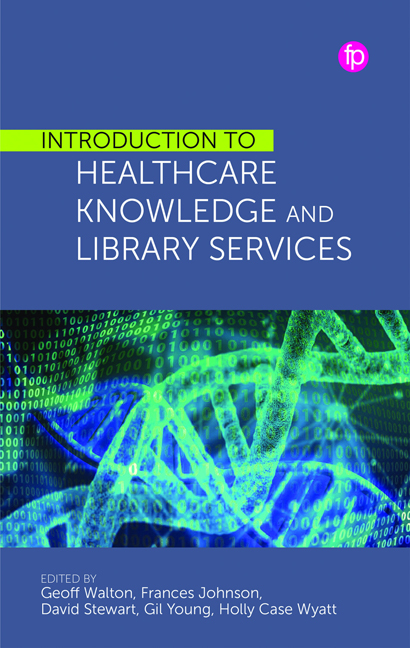Book contents
- Frontmatter
- Contents
- Figures, Tables and Case Studies
- Notes on Contributors
- Foreword
- How to Use this Book
- 1 An Introduction to Healthcare Knowledge and Library Services
- 2 Strategic Development for Healthcare Knowledge and Library Services
- 3 Exploring the Training and Development Needs of the Healthcare Knowledge and Library Services Workforce: A Case Study
- 4 Advocacy and How Knowledge and Library Specialists Tailor Services to Meet the Needs of Their Stakeholders
- 5 Mobilising Evidence and Knowledge
- 6 Internal and External Partnerships
- 7 Health Literacy, Patient Information and Combating Misinformation
- 8 Resource Discovery and Open Access
- 9 Growing the Evidence Base in Healthcare Knowledge and Library Services
- 10 Measuring Progress, Value and Impact in NHS Knowledge and Library Services
- 11 Reflective Practice in Healthcare Settings
- 12 Looking to the Future of Healthcare Knowledge Services
- Index
2 - Strategic Development for Healthcare Knowledge and Library Services
Published online by Cambridge University Press: 22 February 2024
- Frontmatter
- Contents
- Figures, Tables and Case Studies
- Notes on Contributors
- Foreword
- How to Use this Book
- 1 An Introduction to Healthcare Knowledge and Library Services
- 2 Strategic Development for Healthcare Knowledge and Library Services
- 3 Exploring the Training and Development Needs of the Healthcare Knowledge and Library Services Workforce: A Case Study
- 4 Advocacy and How Knowledge and Library Specialists Tailor Services to Meet the Needs of Their Stakeholders
- 5 Mobilising Evidence and Knowledge
- 6 Internal and External Partnerships
- 7 Health Literacy, Patient Information and Combating Misinformation
- 8 Resource Discovery and Open Access
- 9 Growing the Evidence Base in Healthcare Knowledge and Library Services
- 10 Measuring Progress, Value and Impact in NHS Knowledge and Library Services
- 11 Reflective Practice in Healthcare Settings
- 12 Looking to the Future of Healthcare Knowledge Services
- Index
Summary
Introduction
This chapter examines the importance of having a documented strategy for healthcare knowledge and library services. It discusses how to recognise key drivers for the use of knowledge, information and evidence within the health service and how to use these to inform a strategy, with consideration given to aligning the strategy to both organisational and national priorities. The chapter also explains the need to place stakeholders at the heart of strategic development and describes the seven steps involved in creating a strategy, including evaluating the impact and effectiveness of the healthcare knowledge and library service strategy.
Why is strategy important?
A strategy is intrinsic to delivering an effective healthcare knowledge and library service. It showcases how to support the delivery of organisational priorities, aligning to those priorities and ensuring growth. A strategy demonstrates how a service contributes to the overall success of an organisation, the plan to evolve in the future and outlines where a service makes a positive difference. A well written and thought-out strategy gives structure to important conversations within an organisation, but also with other partners. It will be the foundation of business cases, service change, networking and building relationships with senior stakeholders within an organisation.
To underpin improvement and quality assurance, a well aligned strategy is essential. It can be used to communicate the vision to the team and stakeholders and presents a road map of how to get there. Good strategies should have clear SMART objectives (see Figure 2.1 on the next page) that demonstrate how to use team resources, experience and knowledge to advance the ambitions of an organisation. A key part of developing a strategy is ongoing monitoring and review to measure progress against the targets that have been set.
Hooks and levers
The starting point for any strategic development is to consider what is happening in the world that has an impact on the work the service needs to deliver. This may take a wide view to consider political, economic, sociological, technological, legal and environmental issues, but it will also need to consider national and local health-related concerns. National documents that can drive strategic development include other national strategies, policies and legislation.
- Type
- Chapter
- Information
- Publisher: FacetPrint publication year: 2024



